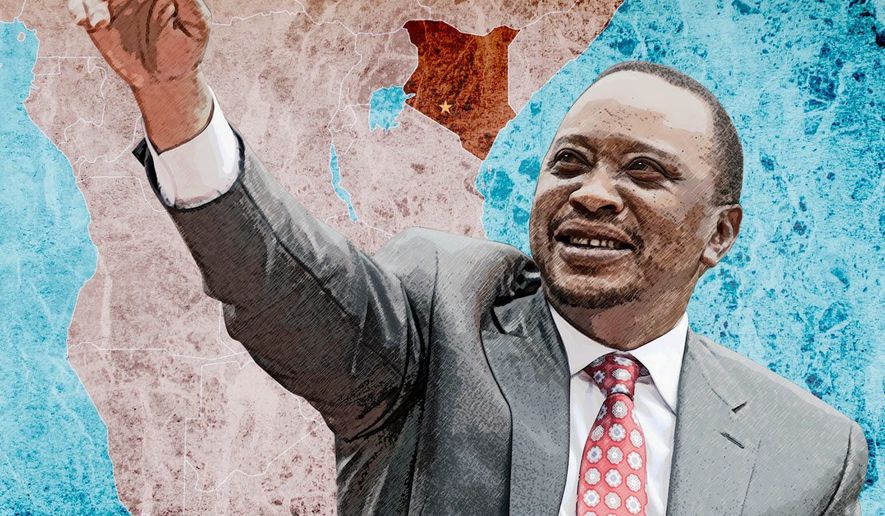OPINION:
After four tumultuous months and two general elections, Kenya — the nation I lead — finally faces the future.
My country of nearly 50 million people now has an administration twice re-elected this year by absolute majority. Our Big Four Action Plan pledges to deliver universal health care, 500,000 new homes and manufacturing jobs fueled through reduced energy tariffs at home, and food security. Beyond our borders, defeating the jihadist threat posed by Al-Shabaab in Somalia remains our first priority. Further afield my government intends to push for African-wide visas, enabling trade and opportunity to spread from Kenya — East Africa’s economic engine — all across the continent.
The first term of my administration laid the foundation upon which these ambitions can be built. We are proud of what we have already achieved, and — because we believed the Kenyan people did also — we fought both elections in 2017, seeking endorsement for the past five years as well as on our program for government now to come.
Today our multi-party system has deep and permanent roots. It is now commonplace in Kenya for political parties to campaign on issues and with manifestos to improve citizens’ everyday lives, when once it was not. We enjoy a fearless and free press; devolved government brings decision-making, respectful of regional and cultural difference, closer to communities; the judiciary’s independence from politicians and the powerful is demonstrated time and again, most recently by the Supreme Court’s annulment of our August general election. All these necessities define what it is to be a democratic society. Democracy does not exist by the casting of ballots alone.
I believe there remains a final element unaccounted for in Kenya — required for our multi-party democracy to reach full maturity: a strong, bold and inquisitive elected opposition. One that holds government accountable for performance, the implementation of promises, and use of public money.
We have an opposition that is competitive in elections, capable of rallying thousands to their cause, and with considerable strength in Parliament. However, for the past five years as key government decisions were made — on infrastructure programs, education, health and on military action against Al-Shabaab — none faced the serious scrutiny or inquisition that should be expected from an opposition in Parliament.
Instead of focusing on bread-and-butter issues they have sought a new referendum on Kenya’s constitution — a document they helped create — they have proposed changes to electoral law, then opposed those very changes and, after demanding the annulment of the August election, they boycotted the fresh ballot called.
Constitutional questions are important for good governance. However, in the end, they do not create jobs, nor deliver welfare or security, nor put food on the table.
It is not, of course, the role or responsibility of a democratically elected president anywhere in the world to propose those issues on which an opposition might choose to campaign, or the government decisions they should most vigorously oppose or question — quite the opposite.
Still, it remains self-evident that democratic government works best — and is most aligned to the interests of those it serves — when held responsible and to account.
Instead of acknowledging this reality, the opposition appear mesmerized by alternative facts. On Dec. 10, they declared they would announce the date for an alternative presidential swearing-in “in the coming days.” This they apparently justify by the August election result they once called fraudulent and sought annulled, but which now they insist they won. Opposition leader Raila Odinga claims his own, invented, “People’s Assembly” is Kenya’s true Parliament. He contends that regions which voted for him increasingly support secession; and he states that election results delivering decisive presidential and parliamentary majorities were, in fact, an instruction from voters that they demand a coalition government. Such theatrics may keep the opposition in the newspapers, but they do not make them relevant.
Fortunately, I am a great optimist. As I start my second — and final — term as president, I believe we bear witness to the last days of Kenya’s long history of wasteful political indulgence.
My new government now holds the responsibility to implement our manifesto through a parliamentary majority bequeathed from the Kenyan people. The very same voters accredited the opposition with a different — though equally defined — responsibility. I believe it is a role the opposition can rise to perform.
Should they do so, they can rightly be called joint stewards of the final completion of Kenya’s multi-party democracy. But only by ascending to the challenge of holding my government to account through Parliament and the media can they truly serve those they claim to represent — the people of Kenya — and in a manner that they manifestly deserve.
• Uhuru Kenyatta is president of the Republic of Kenya.




Please read our comment policy before commenting.